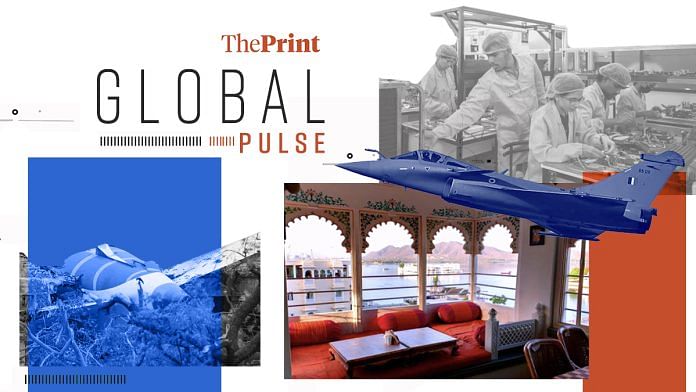New Delhi: In an article titled “How did Pakistan shoot down Indian fighter jets?”, the Economist writes, “the Indian government disputes Pakistan’s claim to have shot down six warplanes, including three of its new French Rafale jets”, during the latest India-Pakistan stand-off following Operation Sindoor—launched in response to the terror attack in Jammu and Kashmir’s Pahalgam.
According to The Economist article, foreign military analysts believe India lost at least five jets. Among them was reportedly a French-made Rafale, which is said to have underperformed in combat.
Another crucial factor, as noted in The Economist’s latest Essential India newsletter, is that India may have overlooked the role of China—Pakistan’s primary arms supplier.
Another report in The Economist points out that India has emerged as a prime destination for hotel brands—citing economy being at an “inflection point” and the popularity of religious tourism. But it’s a boom dependent only on local tourists.
“Although most cities—including trading hubs and the capitals of many states—still lack decent hotels, that is changing. Ten years ago, 69% of India’s branded rooms were in ten cities. That has dropped to 58% this year. Horwath HTL, a hospitality consultancy, expects the figure to fall to 50% by 2029. Last year, two-thirds of hotel openings were outside the top-ten cities,” says the article.
In Financial Times’ India Business Briefing, John Reed writes that the Modi government is “killing off” one of its most successful industrial policies—the Production-Linked Incentive (PLI) scheme under the Make in India initiative—in favour of boosting investment in “sub-assemblies, components and capital equipment”. If all goes well, it could mean more manufacturing by Apple in India.
“But even (Prime Minister Narendra) Modi’s economics team—notwithstanding India’s Apple windfall—has had its own issues with this business: they want India to capture more of the value chain. Apple’s contractors in India still import most of the components that go into iPhones, with some observers dismissing Foxconn’s and Tata Electronics’ iPhone operations as ‘screwdriver work’,” says the newsletter.
Air India has found “no issues” with fuel switches on its other Boeing aircraft. This is crucial as it comes amid preliminary findings into the Ahmedabad plane crash putting focus on the actions of the plane’s captain prior to the crash, reports Hannah Ellis-Petersen in The Guardian.
Both Tesla and Starlink have “hit milestones” in India, after years of Elon Musk attempting to break into the market—Tesla just opened its first showroom in Mumbai’s Bandra, and Starlink is all set to begin commercial operations, reports Pranav Baskar in The New York Times.
“Experts said the developments are signs of progress for Mr Musk’s efforts to enter India, a country led by Prime Minister Narendra Modi, with whom Mr Musk has a complicated relationship. Mr Musk’s social media company, X, is suing the Indian government over a claim that it misused the law to block content on the platform — even as the two leaders have met often to talk business,” the report says.
(Edited by Nida Fatima Siddiqui)
Also Read: Air India crash probe: WSJ report says black-box recording puts focus on senior pilot’s ‘actions’




